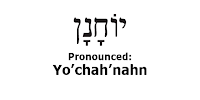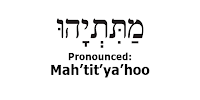Sarah
(Are you looking for our Twebrew School Treats about the Hebrew alphabet or our Hebrew Instructional videos? Click here for a directory!)

Click here to hear Sah'rah pronounced
Few Biblical names are as common, popular and unchanged through time as Sarah. While most people could probably identify Sarah as the matriarch of the Jewish people, the fact is that this was not her given name. For the vast majority of her life, Sarah’s name was Sarai. One might think: Sarah, Sarai, no big difference--no big deal. But, in Sarah’s life this made a tremendous difference.
Sarai bat (the daughter of) Haran was not destined to have a child. The course set out for Sarai on the Divine map did not include motherhood. When Sarai and her husband, Abram, chose to dedicate their lives to sharing God with a world that had fallen into idolatry, the Divine map of her life was given the opportunity to be rewritten. And so God changed the name of both Sarai and Abram. At age 89, Sarai became Sarah. Abram, age 99, became Abraham. Shortly thereafter their son Isaac (Yitzchak) was conceived.
There are numerous discussions among the sages regarding the significance of the name changes. Most commonly, it is pointed out that they both received an additional Hebrew letter hey in their names. “Hey” is one of the letters of God’s name. In the construct of Hebrew grammar, possessive form is often indicated by a suffix. A yud suffix is the possessive ending for first person singular. The hey suffix is the possessive ending for the third person singular ending. In becoming a mother, and fulfilling God’s announcement that Abraham (and Sarah) would be the ancestors of a great nation, Sarah gave herself to the future generations whom she knew would follow in her (and her husband’s) ways.
Copyright © 2011 National Jewish Outreach Program. All rights reserved.

Click here to hear Sah'rah pronounced
Few Biblical names are as common, popular and unchanged through time as Sarah. While most people could probably identify Sarah as the matriarch of the Jewish people, the fact is that this was not her given name. For the vast majority of her life, Sarah’s name was Sarai. One might think: Sarah, Sarai, no big difference--no big deal. But, in Sarah’s life this made a tremendous difference.
Sarai bat (the daughter of) Haran was not destined to have a child. The course set out for Sarai on the Divine map did not include motherhood. When Sarai and her husband, Abram, chose to dedicate their lives to sharing God with a world that had fallen into idolatry, the Divine map of her life was given the opportunity to be rewritten. And so God changed the name of both Sarai and Abram. At age 89, Sarai became Sarah. Abram, age 99, became Abraham. Shortly thereafter their son Isaac (Yitzchak) was conceived.
There are numerous discussions among the sages regarding the significance of the name changes. Most commonly, it is pointed out that they both received an additional Hebrew letter hey in their names. “Hey” is one of the letters of God’s name. In the construct of Hebrew grammar, possessive form is often indicated by a suffix. A yud suffix is the possessive ending for first person singular. The hey suffix is the possessive ending for the third person singular ending. In becoming a mother, and fulfilling God’s announcement that Abraham (and Sarah) would be the ancestors of a great nation, Sarah gave herself to the future generations whom she knew would follow in her (and her husband’s) ways.
Copyright © 2011 National Jewish Outreach Program. All rights reserved.


Comments
Post a Comment